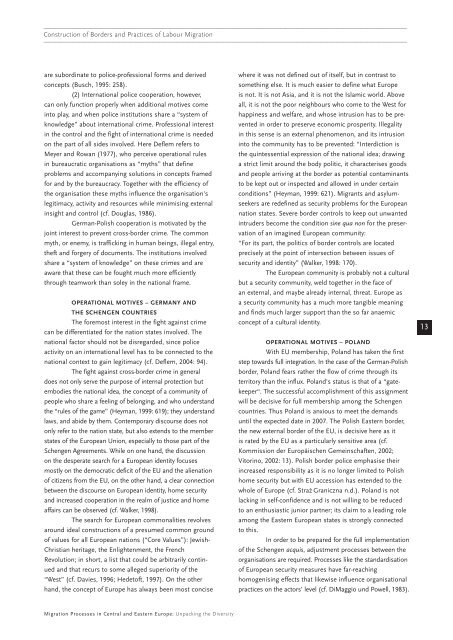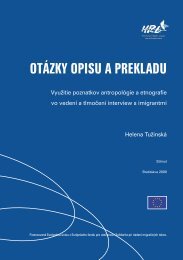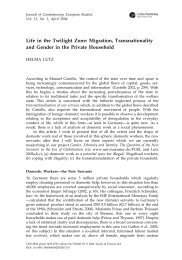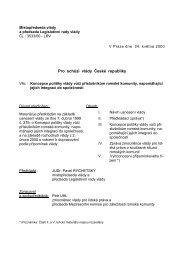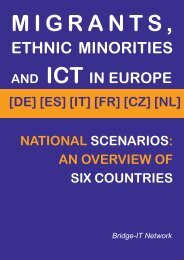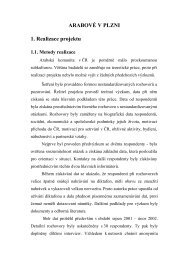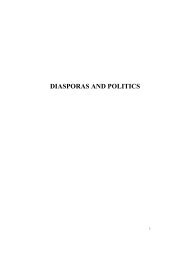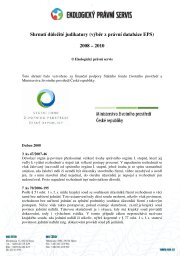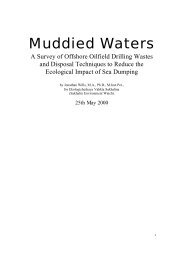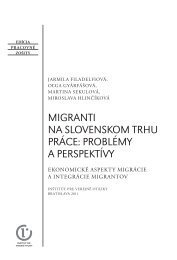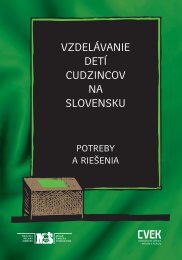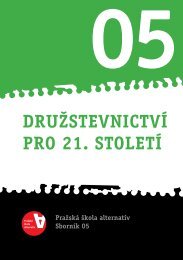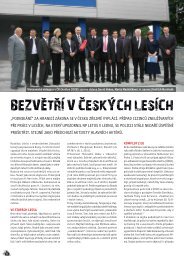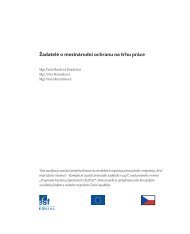Migration Processes in Central and Eastern Europe - Multiple Choices
Migration Processes in Central and Eastern Europe - Multiple Choices
Migration Processes in Central and Eastern Europe - Multiple Choices
Create successful ePaper yourself
Turn your PDF publications into a flip-book with our unique Google optimized e-Paper software.
———————————————————————————————————————————————————————————————<br />
Construction of Borders <strong>and</strong> Practices of Labour <strong>Migration</strong><br />
———————————————————————————————————————————————————————————————<br />
are subord<strong>in</strong>ate to police-professional forms <strong>and</strong> derived<br />
concepts (Busch, 1995: 258).<br />
(2) International police cooperation, however,<br />
can only function properly when additional motives come<br />
<strong>in</strong>to play, <strong>and</strong> when police <strong>in</strong>stitutions share a “system of<br />
knowledge” about <strong>in</strong>ternational crime. Professional <strong>in</strong>terest<br />
<strong>in</strong> the control <strong>and</strong> the fight of <strong>in</strong>ternational crime is needed<br />
on the part of all sides <strong>in</strong>volved. Here Deflem refers to<br />
Meyer <strong>and</strong> Rowan (1977), who perceive operational rules<br />
<strong>in</strong> bureaucratic organisations as “myths” that def<strong>in</strong>e<br />
problems <strong>and</strong> accompany<strong>in</strong>g solutions <strong>in</strong> concepts framed<br />
for <strong>and</strong> by the bureaucracy. Together with the efficiency of<br />
the organisation these myths <strong>in</strong>fluence the organisation's<br />
legitimacy, activity <strong>and</strong> resources while m<strong>in</strong>imis<strong>in</strong>g external<br />
<strong>in</strong>sight <strong>and</strong> control (cf. Douglas, 1986).<br />
German-Polish cooperation is motivated by the<br />
jo<strong>in</strong>t <strong>in</strong>terest to prevent cross-border crime. The common<br />
myth, or enemy, is traffick<strong>in</strong>g <strong>in</strong> human be<strong>in</strong>gs, illegal entry,<br />
theft <strong>and</strong> forgery of documents. The <strong>in</strong>stitutions <strong>in</strong>volved<br />
share a “system of knowledge” on these crimes <strong>and</strong> are<br />
aware that these can be fought much more efficiently<br />
through teamwork than soley <strong>in</strong> the national frame.<br />
OPERATIONAL MOTIVES – GERMANY AND<br />
THE SCHENGEN COUNTRIES<br />
The foremost <strong>in</strong>terest <strong>in</strong> the fight aga<strong>in</strong>st crime<br />
can be differentiated for the nation states <strong>in</strong>volved. The<br />
national factor should not be disregarded, s<strong>in</strong>ce police<br />
activity on an <strong>in</strong>ternational level has to be connected to the<br />
national context to ga<strong>in</strong> legitimacy (cf. Deflem, 2004: 94).<br />
The fight aga<strong>in</strong>st cross-border crime <strong>in</strong> general<br />
does not only serve the purpose of <strong>in</strong>ternal protection but<br />
embodies the national idea, the concept of a community of<br />
people who share a feel<strong>in</strong>g of belong<strong>in</strong>g, <strong>and</strong> who underst<strong>and</strong><br />
the “rules of the game” (Heyman, 1999: 619); they underst<strong>and</strong><br />
laws, <strong>and</strong> abide by them. Contemporary discourse does not<br />
only refer to the nation state, but also extends to the member<br />
states of the <strong>Europe</strong>an Union, especially to those part of the<br />
Schengen Agreements. While on one h<strong>and</strong>, the discussion<br />
on the desperate search for a <strong>Europe</strong>an identity focuses<br />
mostly on the democratic deficit of the EU <strong>and</strong> the alienation<br />
of citizens from the EU, on the other h<strong>and</strong>, a clear connection<br />
between the discourse on <strong>Europe</strong>an identity, home security<br />
<strong>and</strong> <strong>in</strong>creased cooperation <strong>in</strong> the realm of justice <strong>and</strong> home<br />
affairs can be observed (cf. Walker, 1998).<br />
The search for <strong>Europe</strong>an commonalities revolves<br />
around ideal constructions of a presumed common ground<br />
of values for all <strong>Europe</strong>an nations (“Core Values”): Jewish-<br />
Christian heritage, the Enlightenment, the French<br />
Revolution; <strong>in</strong> short, a list that could be arbitrarily cont<strong>in</strong>ued<br />
<strong>and</strong> that recurs to some alleged superiority of the<br />
“West” (cf. Davies, 1996; Hedetoft, 1997). On the other<br />
h<strong>and</strong>, the concept of <strong>Europe</strong> has always been most concise<br />
where it was not def<strong>in</strong>ed out of itself, but <strong>in</strong> contrast to<br />
someth<strong>in</strong>g else. It is much easier to def<strong>in</strong>e what <strong>Europe</strong><br />
is not. It is not Asia, <strong>and</strong> it is not the Islamic world. Above<br />
all, it is not the poor neighbours who come to the West for<br />
happ<strong>in</strong>ess <strong>and</strong> welfare, <strong>and</strong> whose <strong>in</strong>trusion has to be prevented<br />
<strong>in</strong> order to preserve economic prosperity. Illegality<br />
<strong>in</strong> this sense is an external phenomenon, <strong>and</strong> its <strong>in</strong>trusion<br />
<strong>in</strong>to the community has to be prevented: “Interdiction is<br />
the qu<strong>in</strong>tessential expression of the national idea; draw<strong>in</strong>g<br />
a strict limit around the body politic, it characterises goods<br />
<strong>and</strong> people arriv<strong>in</strong>g at the border as potential contam<strong>in</strong>ants<br />
to be kept out or <strong>in</strong>spected <strong>and</strong> allowed <strong>in</strong> under certa<strong>in</strong><br />
conditions” (Heyman, 1999: 621). Migrants <strong>and</strong> asylumseekers<br />
are redef<strong>in</strong>ed as security problems for the <strong>Europe</strong>an<br />
nation states. Severe border controls to keep out unwanted<br />
<strong>in</strong>truders become the condition s<strong>in</strong>e qua non for the preservation<br />
of an imag<strong>in</strong>ed <strong>Europe</strong>an community:<br />
“For its part, the politics of border controls are located<br />
precisely at the po<strong>in</strong>t of <strong>in</strong>tersection between issues of<br />
security <strong>and</strong> identity” (Walker, 1998: 170).<br />
The <strong>Europe</strong>an community is probably not a cultural<br />
but a security community, weld together <strong>in</strong> the face of<br />
an external, <strong>and</strong> maybe already <strong>in</strong>ternal, threat. <strong>Europe</strong> as<br />
a security community has a much more tangible mean<strong>in</strong>g<br />
<strong>and</strong> f<strong>in</strong>ds much larger support than the so far anaemic<br />
concept of a cultural identity.<br />
OPERATIONAL MOTIVES – POLAND<br />
With EU membership, Pol<strong>and</strong> has taken the first<br />
step towards full <strong>in</strong>tegration. In the case of the German-Polish<br />
border, Pol<strong>and</strong> fears rather the flow of crime through its<br />
territory than the <strong>in</strong>flux. Pol<strong>and</strong>'s status is that of a “gatekeeper“.<br />
The successful accomplishment of this assignment<br />
will be decisive for full membership among the Schengen<br />
countries. Thus Pol<strong>and</strong> is anxious to meet the dem<strong>and</strong>s<br />
until the expected date <strong>in</strong> 2007. The Polish <strong>Eastern</strong> border,<br />
the new external border of the EU, is decisive here as it<br />
is rated by the EU as a particularly sensitive area (cf.<br />
Kommission der Europäischen Geme<strong>in</strong>schaften, 2002;<br />
Vitor<strong>in</strong>o, 2002: 13). Polish border police emphasise their<br />
<strong>in</strong>creased responsibility as it is no longer limited to Polish<br />
home security but with EU accession has extended to the<br />
whole of <strong>Europe</strong> (cf. Straż Graniczna n.d.). Pol<strong>and</strong> is not<br />
lack<strong>in</strong>g <strong>in</strong> self-confidence <strong>and</strong> is not will<strong>in</strong>g to be reduced<br />
to an enthusiastic junior partner; its claim to a lead<strong>in</strong>g role<br />
among the <strong>Eastern</strong> <strong>Europe</strong>an states is strongly connected<br />
to this.<br />
In order to be prepared for the full implementation<br />
of the Schengen acquis, adjustment processes between the<br />
organisations are required. <strong>Processes</strong> like the st<strong>and</strong>ardisation<br />
of <strong>Europe</strong>an security measures have far-reach<strong>in</strong>g<br />
homogenis<strong>in</strong>g effects that likewise <strong>in</strong>fluence organisational<br />
practices on the actors' level (cf. DiMaggio und Powell, 1983).<br />
13<br />
<strong>Migration</strong> <strong>Processes</strong> <strong>in</strong> <strong>Central</strong> <strong>and</strong> <strong>Eastern</strong> <strong>Europe</strong>: Unpack<strong>in</strong>g the Diversity


